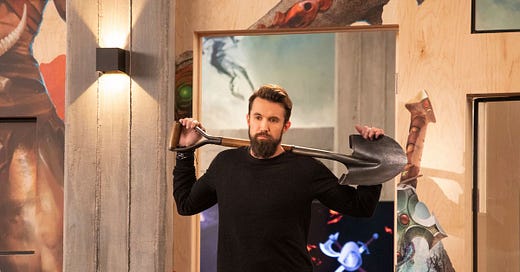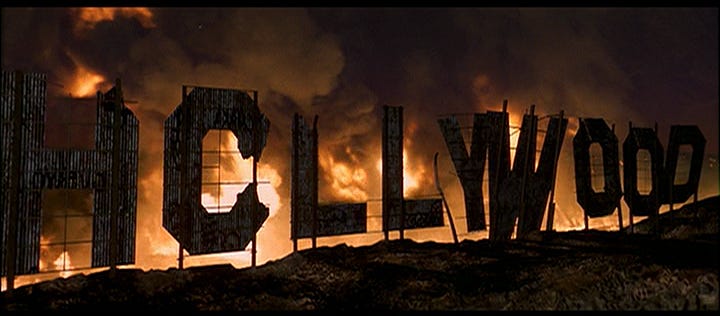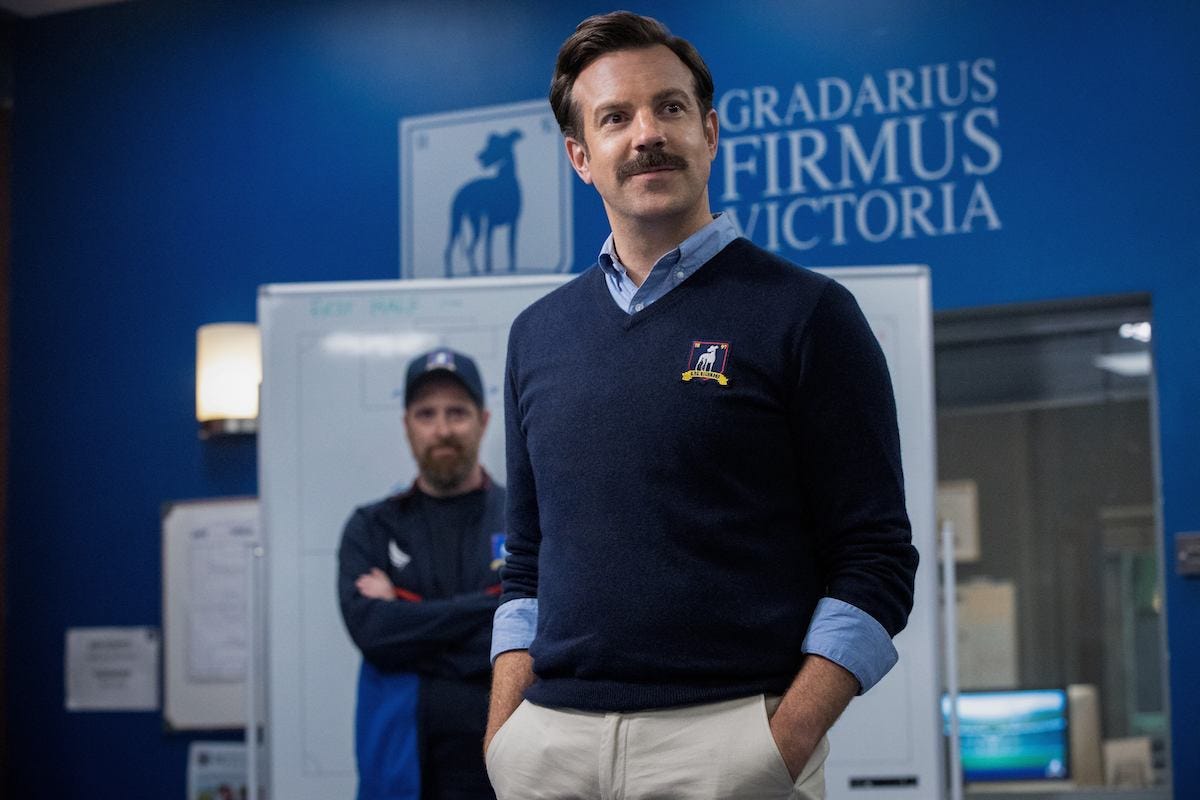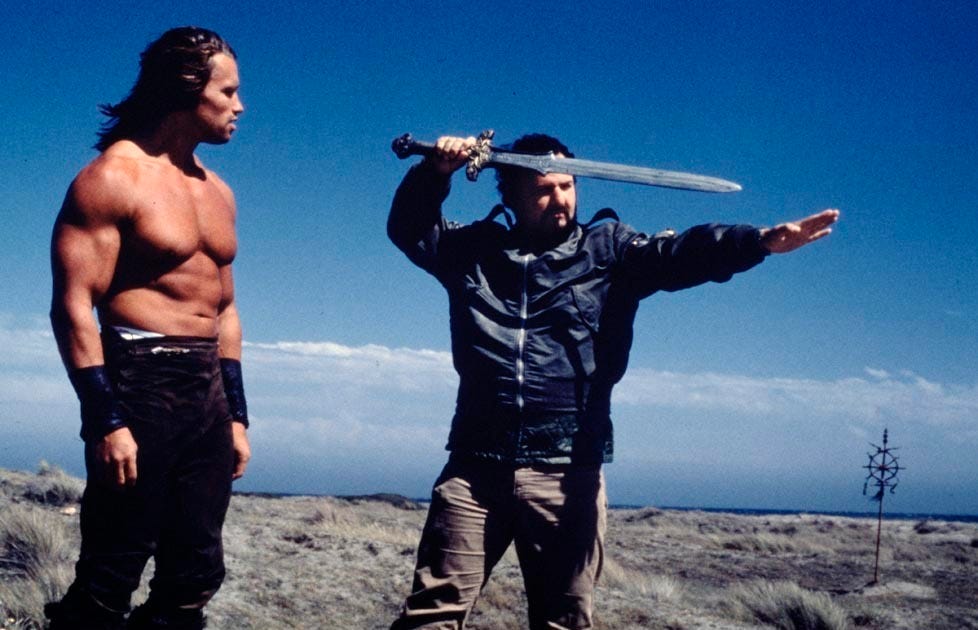Who Killed Hollywood (Again)?
Plus: 'Ted Lasso' and 'Mythic Quest' reviewed!
The books about Hollywood I find myself recommending most frequently are those by William Goldman. Adventures in the Screen Trade and Which Lie Did I Tell? More Adventures in the Screen Trade are must-reads for those of you who have any interest in how Hollywood works on a personal level.
Goldman, who died in 2018 at the age of 87, had on his resume Butch Cassidy and the Sundance Kid, All the President’s Men, The Princess Bride, Marathon Man, Misery, Maverick, and a host of other pictures. He won two Oscars (for Butch Cassidy and President’s Men), published a couple of collections of his screenplays, wrote a handful of solid novels, authored two memoirs, wrote a book about a year on Broadway, and, in his spare time, spent the 1990s chronicling Hollywood’s downward spiral for publications like Premiere and New York magazine.
Said spiral is captured in The Big Picture: Who Killed Hollywood? and Other Essays, a 2001 series of essays he wrote in the 1990s about the state of the movie business, complete with predictions about what will capture the box office and what will get lost in the shuffle, as well as the state of the Oscar races in each of those years. These two things are inextricably linked, power (in the form of box office gold) and prestige (in the form of Oscar gold) commingling in ways that can only truly be appreciated by someone who accepts the absurdity of the entire situation.
Goldman accepts this and the book sings as a result. He’s interested in star power because star power means sales, and as the years go on we watch the rise of Arnold Schwarzenegger and Kevin Costner’s unexpected tumble and Tom Cruise’s ascent and Tom Hanks’s unforeseen placement as king of the hill, undisputed star of the decade. He’s interested in prestige because he knows that’s how executives making movies for overgrown boys who like to watch things explode real good soothe themselves to sleep at night: Sure, that’s a mattress stuffed with hundred dollar bills they’re lying on top of, but they love to cuddle with their gold statues.
So it’s informative to watch Goldman’s despair grow as the big studios fail to put out anything worthwhile and the indies fill the void, capturing Oscar’s attention. While this leads to some amusing moments in hindsight—Goldman names Miramax studio of the decade and sings the praises of the Weinsteins—what really jumps out is just how static the industry has been in the almost 20 years between the publication of The Big Picture and last year’s COVID-sparked theatrical apocalypse. Here’s a passage from a 1997 essay on the Oscar-nominated films released in 1996:
The studios have forgotten that movies had better thrill us here—in America. The reason they make comic-book bloodbath pictures is simple and businesslike—there is an audience for them abroad. The biggest-grossing films of last year, Independence Day, Twister, Mission: Impossible and The Rock, all performed better overseas than they did here—at last count, by at least $335 million.
The studios are making movies today for mouth-breathers in foreign lands, testosterone-filled young men who get off on violence.
And this was before the comic book boom really kicked in, before Blade and X-Men and Spider-Man and then another Spider-Man and the MCU (and the MCU’s Spider-Man, the best of all Spider-Men) and the DCEU, before cinematic universes and the rest. Hell, the Star Wars prequels hadn’t even started filming yet and domestic/foreign splits were closer to 50/50 than the 67/33 they more frequently resemble now.
What I’m saying is, that downward spiral became the new normal, and it more or less worked until the black swan of COVID. And all of the things Goldman cared about and could track are gone, wiped away. Who is the biggest star in the age of streaming? We have no way to tell. Box office data is irrelevant and the streamers closely guard their data. We have no idea if Chris Hemsworth or Emma Roberts moves the needle more. What films are the most likely to win Oscar gold? No one knows and who cares anyway: The Oscars matter less than ever, with the annual awards ceremony’s ratings tumbling due to structural issues revolving around television audiences in general and also because they’ve become the playground of micro studios like A24 and Neon. Whatever wins the little gold statue will be something most people see on TV.
And yet, Hollywood doesn’t die. It shifts, it transforms, it mutates. But it persists. What form will it take next, as the business and distribution and tech environments shift? Well, that’s the story of the decade ahead. Hopefully we find someone as brilliant as Goldman to chronicle it.
Part of that fracturing and siloing involves the rise of Substack. I really appreciate you taking the time to read my scribblings, and if you enjoy them—as well as essays by folks like James Emanuel Shapiro (who founded the analytics department at Alamo Drafthouse) or podcasts like Across the Movie Aisle and the Bulwark Goes to Hollywood—please consider signing up for a Bulwark+ membership! Not only will you get access to exclusive members-only episodes of our podcasts, you’ll also help keep this enterprise sustainable.
If you don’t support the things you love, they go away. So if you love this newsletter, consider chipping in.
Review: Ted Lasso and Mythic Quest (Apple TV+)
If the story of the 1990s was, at least in part, one of audience consolidation—bigger budgets to afford bigger stars to ensure bigger openings—the story of the 2020s will likely focus on audience scission. It’s still too early to say whether or not theatrical exhibition’s collapse will be a permanent casualty of COVID, but its demise would shatter the model Goldman followed in the 1990s; a shift to VOD and streaming means a shift to more, and cheaper, movies competing for your attention rather than a handful of movies trying to dominate it. On the TV side of things, this dissolution is the culmination of a long-running trend, one that saw us go from three broadcast networks dominating attention to cable siphoning off audience share to streaming services offering up a nigh-on unlimited amount of content targeting every niche audience around.
One result of this scission is siloing: Very few people can afford to subscribe to every channel and every service, and, as a result, some great stuff gets siloed off from the masses and fails to receive the attention it’s due. Consider Ted Lasso and Mythic Quest, the two best reasons to subscribe to Apple TV+.
Ted Lasso stars Jason Sudeikis as the titular Ted, a college football coach who gets hired to manage a soccer team in England’s Premier League. He’s being set up to fail by Rebecca Welton (Hannah Waddingham), who has taken ownership of the team after a nasty divorce; she wants to punish her former husband by destroying the only thing he ever truly loved, his soccer team. Needless to say, the players, press, and public all hate the American, chants of “wanker” raining down on him whenever he nears the touchline.
But Ted, with the aid of Coach Beard (Brendan Hunt) and locker-room attendant Nathan (Nick Mohammed), slowly wins everyone over with his boyish charm and exuberance. And in so doing he does more than help his players win games and help his owner realize that the club means more than a method of revenge against a former husband. He helps them all become better people.
What’s so delightful about Ted Lasso is its earnestness; it’s not saccharine, but it is sweet. He’s the best life coach you’ve ever seen, a fountain of positivity that never stops flowing. Whether he’s aiding aging midfielder Roy Kent (Brett Goldstein) in his effort to come to grips with the fact that his days as a Premiership star are coming to an end or teaching young phenom Jamie Tartt (Phil Dunster) how to be less selfish on the pitch, Lasso is making all of their lives a little bit better. In a world of cynicism verging on despair, there’s something to be said for a compelling demonstration of common decency.
And, of course, it’s funny. I’ve long argued that Sudeikis is one of the most underrated cast members in SNL history, and his rubbery grin in this show is deeply contagious. He’s got great chemistry with Brendan Hunt, the two bouncing off of each other like old friends.
Mythic Quest is similarly funny. The Office by way of Silicon Valley from the team that brought It’s Always Sunny in Philadelphia to life, Mythic Quest follows the travails of a team of executives responsible for a hugely popular MMORPG as they attempt to navigate the wilds of the Internet and office politics alike.
Ian (Rob McElhenney) is a megalomaniac game designer who thinks of himself as an artistic visionary, even when the extent of his vision is ensuring that people can use shovels in the game as weapons. Poppy (Charlotte Nicdao) is a programmer who wants nothing more than credit for a shovel (that doesn’t kill people). And David (David Hornsby) is the executive who has to deal with the mundane aspects of Internet management, like trying to figure out how best to ban Nazis from your service without it turning into a whole thing.
Mythic Quest is one of the best shows I’ve ever seen about Internet culture, and the weird (and occasionally insidious) ways online space can intrude into meat space. As such, it probably shouldn’t be surprising that Mythic Quest is literally the only piece of entertainment programming out there that has successfully pulled off a “quarantine episode.” Theirs is a world of screens as it is; shifting to work Zooms and communicating solely via computer was a natural extension of the show’s internal logic.
More than visual logic, though, was the emotional logic of such a shift. The isolation leading to weird behavioral tics and difficult home lives. Loneliness creeping toward something close to despair as singletons who have given up basic things like bathing and getting dressed become desperate for connection, wondering if they’re ever going to see anyone again. Mythic Quest is a bit more cynical than Ted Lasso, but the quarantine special was one of the most earnest, emotionally intelligent explanations of what life has been like over the last year for so many people. It deserves to be one of the defining cultural documents of this era.
And it deserves to be seen by more people. Odds are a lot of you got a new iPhone laptop or some other piece of Apple gear for Christmas. Do yourself a favor and take advantage of the free year of Apple TV+ that came along with it so you can watch Mythic Quest and Ted Lasso. You won’t regret it.
Assigned Viewing: Conan the Barbarian (Blu-ray, Showtime)
One of the few bright spots over the last week or so, politically speaking, was Arnold Schwarzenegger’s warning against America’s potential journey down an anti-democratic path. The living embodiment of the American Dream’s stirring video was a reminder of what American greatness really looks like.
One of the props in the video was the sword from Conan the Barbarian. So why not revisit John Milius’s classic tale of a captured boy’s ascent from slave to kingslayer? Replete with classic lines about what is best in life and whether or not Crom can go to hell, Conan the Barbarian is one of the greats.








